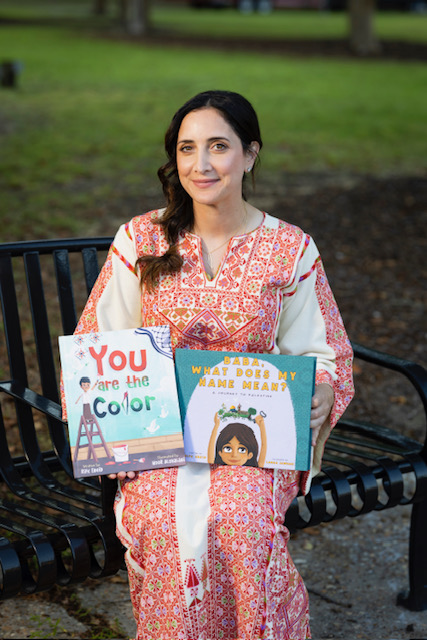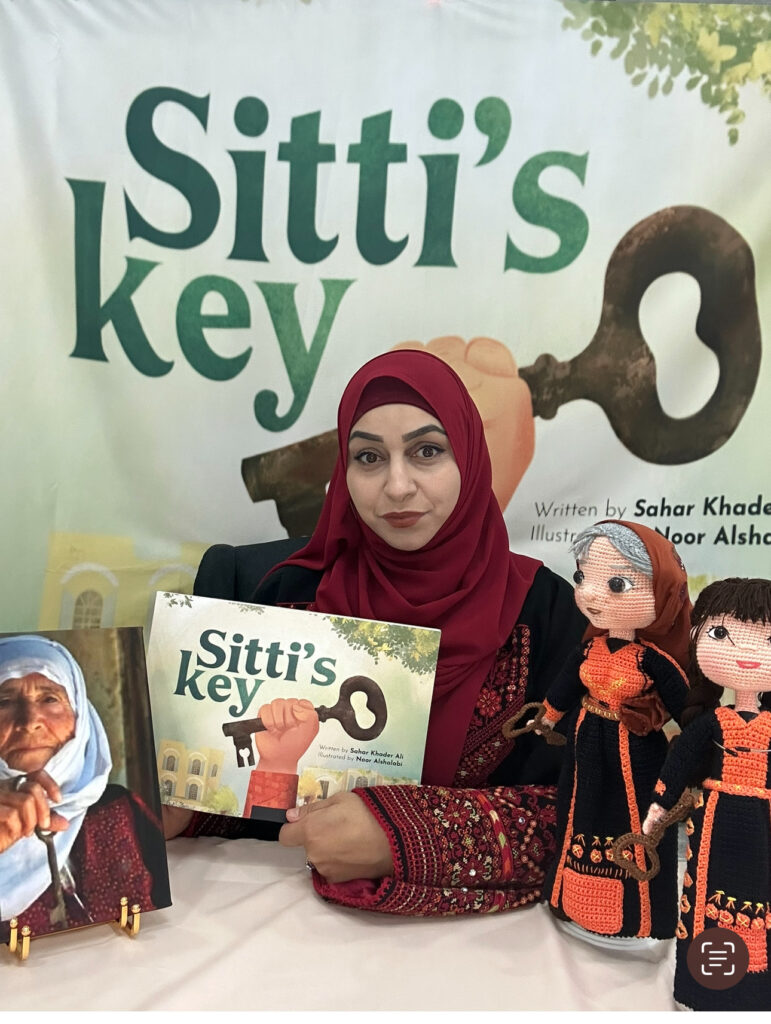In Conversation with the Authors
By Kiran Ansari
Mar/Apr 2024

These days, Muslims worldwide wake up and check their phones to see if a ceasefire has been declared in Gaza. At press time, Palestinians have been killed, injured and displaced for 100+ days. Trying to absorb information from all over social media and a few media outlets that provide some balanced coverage, parents wonder how they can explain the situation to their young children?
“I can shield my children from graphic images of the wounded and killed, but I do not want to shield them from the truth,” said Nida Khan of Fresno, Calif. “We are witnessing a genocide. I owe it to my children to tell them the story of the Palestinian cause in an age-appropriate manner, and one of the best ways to do it is through books. This is even more important for Muslim kids who do not have a Palestinian family member to share stories firsthand.”
Islamic Horizons asked MuslimMemories.com about which children’s books on Palestine have been popular lately. We then set out to interview those authors and learn about their journey to inspire more authors to share, because our children deserve to read authentic stories.
You Are The Color
“I had always wanted to write a book about the Nakba, one of the seminal events in Palestinian history that must be understood in order to understand what is still happening in Palestine today,” said Rifk Ebeid, a Palestinian author who self-published “You Are The Color” and “Baba, What Does My Name Mean?”
“I researched Nakba survivor testimonies and oral history. I delved into what life was like in Palestine before, during and after the Nakba. This took some time due to the heavy nature of the topic and my capacity to process it all.”
After developing the idea, Ebeid worked with Hajera Khaja, a wonderful writing coach, to help bring the story to life. What really helped flesh it out was the process of free writing, seeing where the pen was taking her and what plot sequence felt like it captured what she wanted to convey. The result is an impactful and authentic story of one Palestinian family that encompasses many of the real experiences during the Nakba.
Ebeid believes that for Palestinians, as they resist the erasure of their culture and existence, sharing stories is crucial to documenting their experiences. “Every action we take individually will have a ripple effect collectively. You never know who is listening, who is learning from you and what they will do in the future with that knowledge they have gained,” she stated.
“Sitti’s Key”
“I never understood the history of my homeland until I visited Palestine and learned about its rich history,” said Sahar Khader, author of “Sitti’s Key.” She continued, “When I had my first child, I was always looking for books that shared Palestine’s history in a simple way, but I never found them. So I took matters into my own hands and decided that I should publish a children’s book about the collective memory of the key.” In 2023, this proud Palestinian did just that.
In light of the current genocide in Gaza, the book presents the repetition of history. Readers find flashbacks about what happened in 1948, when 750,000 Palestinians were expelled from their homes. Unfortunately, what is happening now in Gaza is even worse — more than 1.2 million Palestinians have had to leave their homes. This book teaches the younger generation that what is going on today in Gaza has been happening for 75 years.
“My Garden Over Gaza”
Sarah Musa started writing “My Garden Over Gaza” in May 2021 when Israel was bombing Gaza. As a Palestinian-American living in Jordan, she had watched this happen for years. “My father left the Al-Quds region when he was 15, and he was never allowed back,” she said. “It is painful to watch how history repeats itself again and again.”
As she started getting vocal on Instagram and getting to know activists, one of her writer friends encouraged her to write a book. That was her lightbulb moment. “Palestine is a part of who I am, so why haven’t I done it yet?” Musa wondered. “I have had a rooftop garden like they have in Gaza. It’s one way for them to produce their own food because of sieges and the aerial spraying of herbicides on agricultural crops.”
Types of Publishing
Although there have been a handful of children’s books about Palestine from traditional publishing houses, Muslim authors aren’t happy about the representation. Many Palestinian authors fear that their story will be diluted, sanitized or edited. Even though Ebeid has heard from some author friends that they have more control over the narrative, it’s still an uphill battle. Muslims have seen silence and censorship from the book community during this genocide.
“The topic of self-publishing vs. traditional publishing is multi-layered. I hate to distinguish when it comes to Palestine, in particular, because of how Palestinian voices have been censored for decades,” she said. “Although I understand the aspect of wanting to hold mainstream publishers accountable for being more inclusive of diverse voices, I find the distinction between the two routes to be divisive at a time where we need all hands on deck and should all support each other’s efforts.”

Khader began the publishing process with a mainstream company, but her passion for “Sitti’s Key” was so high that she felt they didn’t understand it, especially when it came to illustration. That led her to cancel her contract with them.
Her book was then published by Little Hibba, a children’s publishing company that empowers Muslim authors to share meaningful messages with the next generation. “They worked closely with me and understood my passion,” Khader related. “I also had the pleasure of working with the illustrator, Noor Alshalabi, who paid attention to certain details and brought my vision to life.”
Musa’s experience with mainstream publishing wasn’t great — not because anything bad happened, but because nothing really happened. She tried to get published for 15 years, but never heard back. She believes many mainstream publishing houses aren’t really interested in unapologetic Muslim stories.
“They want to show they care, but it’s only superficial. They want to just add a Muslim twist to an American story. They have no interest in real Palestinian stories. They want to minimize that kind of stuff,” she asserted.
She wanted to get “A Garden Over Gaza” out quickly. Her sister told her about Ruqaya’s Bookshelf, a Muslim publishing company in Canada. What started out as an eBook flowered into a manuscript.
“I had never written a book about a Muslim protagonist — it was colonized out of my mind,” Musa recollects. “I dove into it 100% and submitted my manuscript in a week. Publisher Asmaa Hussein got back to me promptly, and I signed my first book deal.”
Muslim authors don’t want publishing companies that just pretend to care. They believe that if Muslims want authentic and unapologetic stories, the community needs to support small Muslim publishers. Mainstream publishing companies have huge advertising budgets. The sprouting Muslim publishers don’t have the resources yet, so we, as the umma, have to do that.
“Growing up, I felt like an odd phenomenon with a Palestinian father and Hispanic mother,” Musa said. “As a child, I would have been over the moon to have a book that truly represented me. Now as a parent, rather than always reading about Stephanie and Jake, I want my kids to feel heard and seen. It can boost their self-confidence. So we need to support Muslim authors and publishers. Let’s be their microphones so more people become aware.”
Readers can purchase these and many other titles at www.muslimmemories.com and support Muslim book stores.
Kiran Ansari is the assistant editor of Islamic Horizons. She hopes to visit a free Palestine one day.
Tell us what you thought by joining our Facebook community. You can also send comments and story pitches to horizons@isna.net. Islamic Horizons does not publish unsolicited material.
